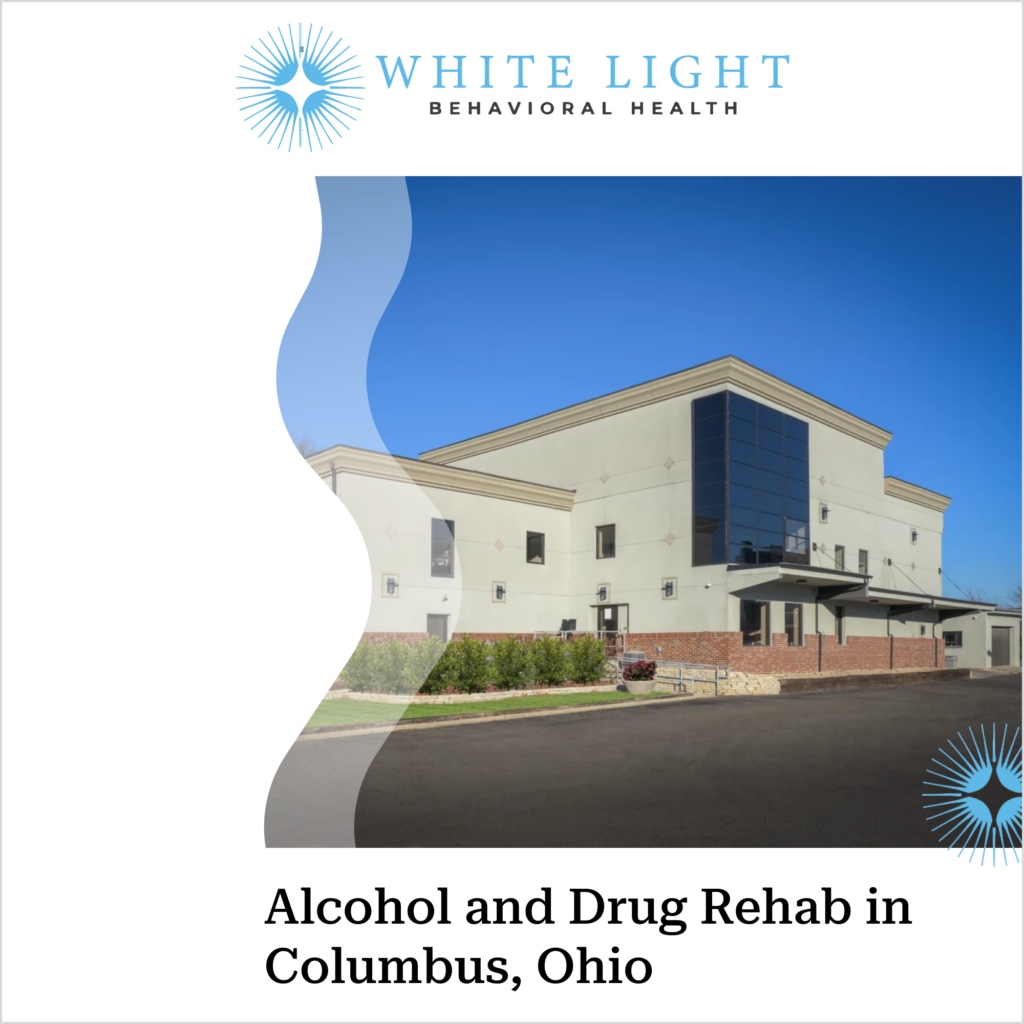Alcohol Addiction Symptoms: Definition, Physical, Psychological, Behavioral, Withdrawal, Co-Occurring
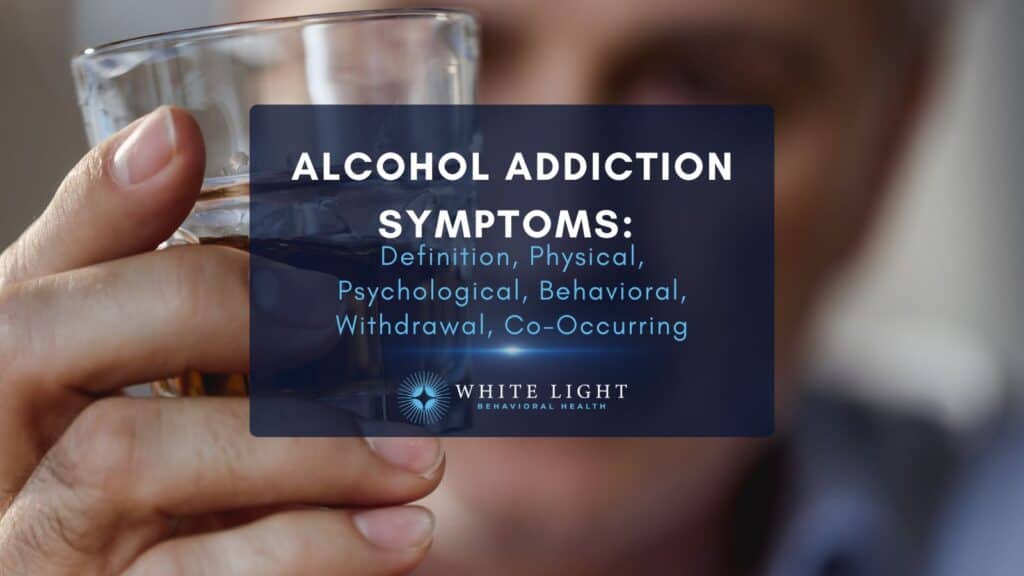
Alcohol addiction symptoms are signs showing a compulsive, problematic pattern of alcohol use, such as drinking more or longer than intended and being unable to cut down despite wanting to. You might also find that alcohol starts interfering with your daily life, health, or relationships.
These symptoms come with other mental health struggles like depression, PTSD, or bipolar disorder. While some psychological signs feel mild, like anxiety or nausea, others are dangerous, including seizures or delirium tremens.
Healthcare providers use tools like the AUDIT, CAGE questionnaire, and DSM-5 criteria to assess how serious the addiction is and what kind of help you need. According to the Ohio Department of Mental Health and Addiction Services (ODMHAS) in their Ohio Alcohol and Drug Use Statistics report (2023), approximately 5.1% of Ohio residents struggle with alcohol use disorder annually.
What Is Alcohol Addiction (Alcoholism)?
Alcohol addiction, also known as alcoholism or alcohol use disorder (AUD), is a chronic disease characterized by an inability to control alcohol consumption despite negative consequences.
Alcoholism causes impaired judgment, slurred speech, loss of coordination, and risky behaviors. Long-term effects include liver disease, cardiovascular problems, neurological damage, and an increased risk of various cancers. A study by the National Institute on Alcohol Abuse and Alcoholism (NIAAA) titled Alcohol Use Disorder Among Young Adults (2023) found that 10.1% of Ohio individuals aged 18–25 experienced alcohol use disorder in the past year.
Did you know most health insurance plans cover substance use disorder treatment? Check your coverage online now.
What Are the Signs and Symptoms of Alcohol Addiction?
The signs and symptoms of alcohol addiction include a range of physical, psychological, and behavioral symptoms that vary in severity. According to the Ohio Department of Health in their Alcohol-Related Deaths in Ohio report (2023), excessive alcohol use accounts for an average of 5,739 annual deaths in Ohio.
What Are Physical Alcohol Addiction Symptoms?
Physical alcohol addiction symptoms include nausea, tremors, excessive sweating, blackouts, and increased tolerance. Over time, these symptoms lead to severe health complications.
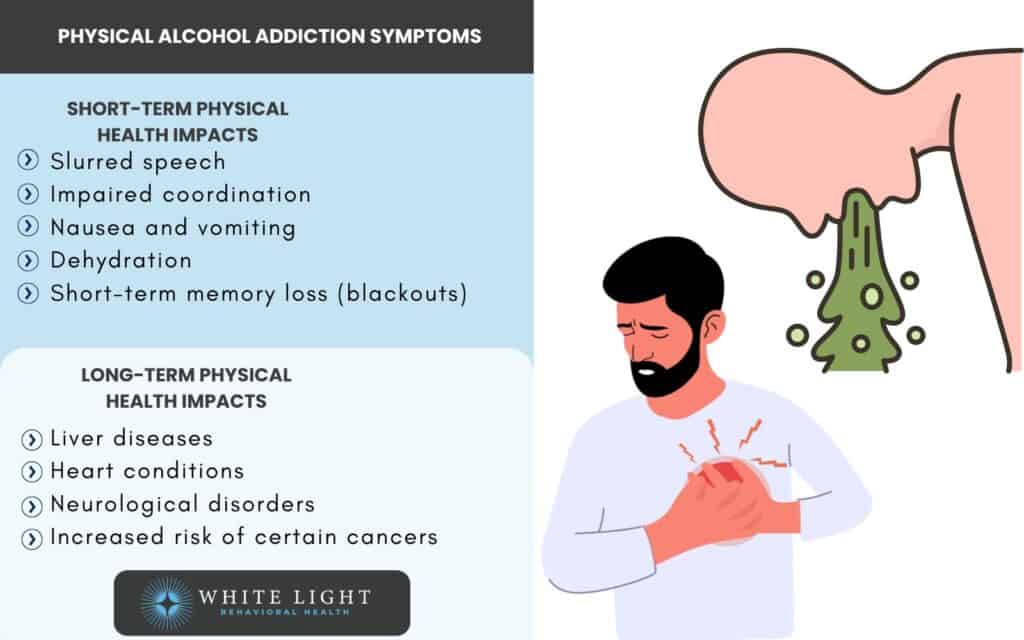
- Slurred speech: Alcohol affects the central nervous system, leading to difficulty articulating words clearly.
- Impaired coordination: Excessive drinking disrupts motor control, increasing the risk of falls and accidents. According to 247WallSt in their Alcohol-Related Driving Fatalities in Ohio study (2020), 32.5% of all driving fatalities in Ohio involved alcohol between 2016 and 2020.
- Nausea and vomiting: Excessive alcohol intake leads to dehydration and discomfort. It is the body’s response to alcohol.
- Dehydration: Alcohol is a diuretic, causing frequent urination and fluid loss, leading to headaches and dizziness.
- Short-term memory loss: Short-term memory loss, also known as blackouts, occurs when alcohol impairs the brain’s ability to store new memories.
- Liver diseases (cirrhosis, fatty liver, hepatitis): Prolonged alcohol use damages liver cells, leading to scarring (cirrhosis) and liver failure.
- Heart conditions (hypertension, cardiomyopathy): Chronic alcohol consumption raises blood pressure and weakens heart muscles, increasing the risk of heart disease.
What Are Psychological Alcohol Addiction Symptoms?
Psychological alcohol addiction symptoms include cravings, mood instability, anxiety, depression, and impaired judgment. Over time, these symptoms contribute to severe mental health conditions, further reinforcing alcohol dependence.
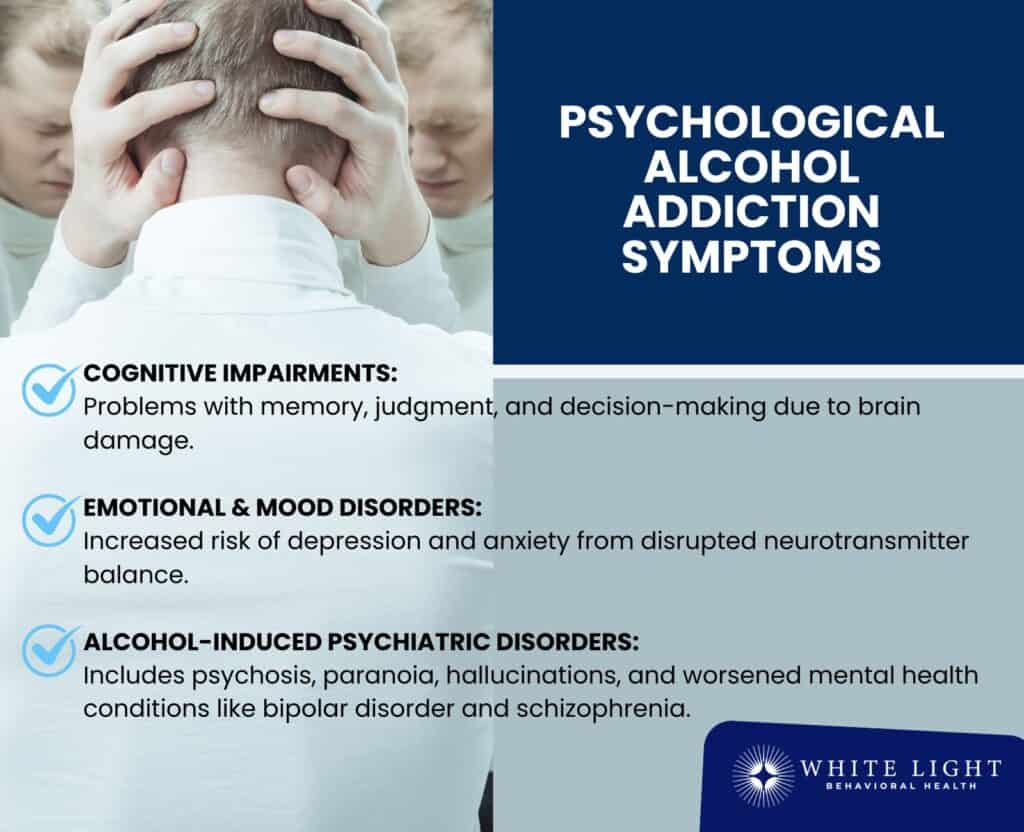
- Cognitive Impairments: Chronic alcohol consumption damages brain regions responsible for memory and executive functions, leading to difficulties in concentration and problem-solving. As a result, individuals with alcohol addiction struggle with attention deficits, blackouts, and slower reaction times, increasing the risk of accidents and poor decision-making.
- Emotional & Mood Disorders: Mood disorders are mental health conditions that primarily affect a person’s emotional state, leading to persistent feelings of sadness, irritability, or extreme mood fluctuations.
Excessive drinking creates a cycle where alcohol temporarily numbs emotional pain but ultimately worsens mood instability, increasing the risk of self-harm and suicidal ideation.
- Alcohol-Induced Psychiatric Disorders: Alcohol-induced psychiatric disorders include alcohol-related psychosis, paranoia, and hallucinations. Heavy alcohol consumption alters brain function, potentially leading to alcohol-induced psychotic disorder (AIPD), characterized by delusions and hallucinations resembling schizophrenia.
What Are the Behavioral Symptoms of Alcohol Addiction?
Behavioral symptoms of alcohol addiction are compulsive drinking, neglect of responsibilities, secrecy about alcohol use, and engaging in risky activities while intoxicated. More Resources on Addiction:
Over time, individuals struggle with social relationships, legal issues, and financial instability.
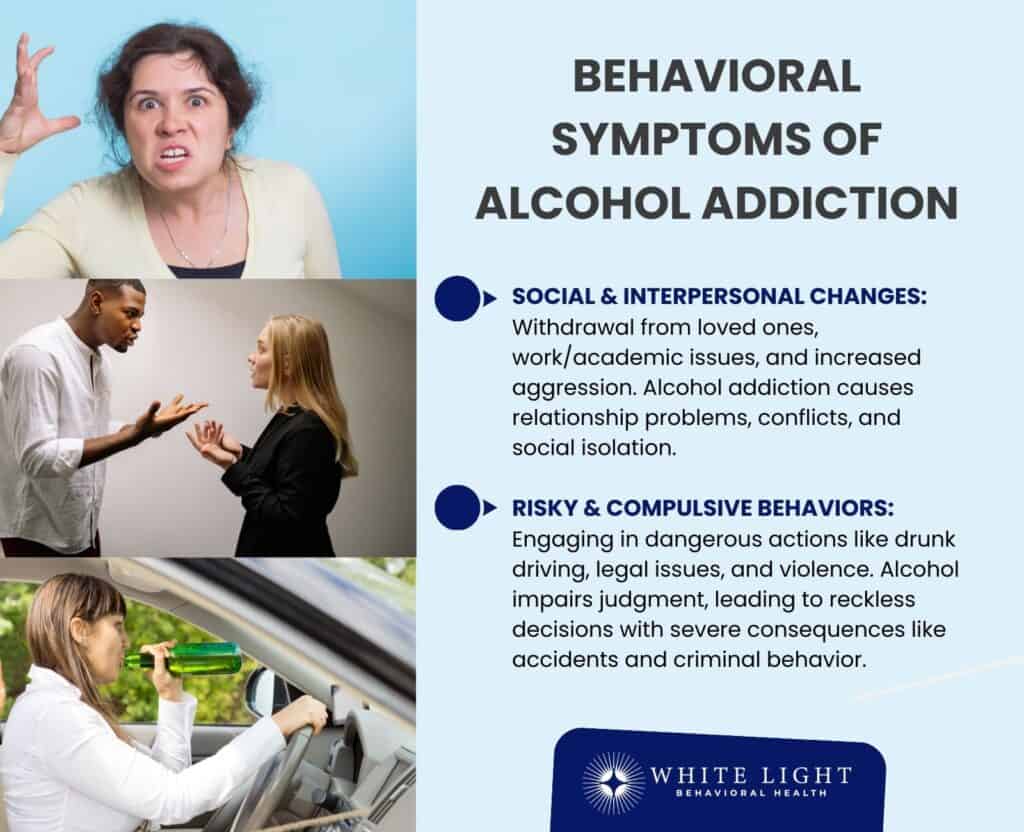
- Social & Interpersonal Changes: Behavioral alcohol addiction symptoms include withdrawal from family and friends, poor work or academic performance, and increased conflicts or aggression. Alcohol addiction leads individuals to isolate themselves, avoiding loved ones to hide their drinking habits.
Over time, relationships deteriorate due to broken trust, missed commitments, and erratic behavior.
- Risky & Compulsive Behaviors: Risky and compulsive behaviors are hallmark signs of alcohol addiction, leading to severe consequences. These behaviours include drunk driving, legal issues, domestic violence, and criminal activity.
Alcohol impairs judgment, reducing an individual’s ability to assess risks properly, leading to reckless decisions.
What are Chronic Illnesses Linked to Alcohol Abuse?
The chronic illnesses linked to alcohol abuse include cirrhosis, pancreatitis, and an increased risk. Cirrhosis is a severe liver condition where prolonged alcohol consumption causes irreversible scarring, leading to liver failure.
Inflammation of the pancreas occurs due to excessive alcohol intake, resulting in digestive complications and severe pain. Alcohol consumption also contributes to DNA damage, increasing the likelihood of developing cancers such as liver, oesophageal, and colorectal cancer.
Contact us today to schedule an initial assessment or to learn more about our services. Whether you are seeking intensive outpatient care or simply need guidance on your mental health journey, we are here to help.
What Are Alcohol Withdrawal Symptoms?
Alcohol withdrawal symptoms are a range of physical and psychological effects that occur when a person who has been drinking heavily stops or reduces alcohol consumption. Early withdrawal symptoms begin within 6 to 12 hours of the last drink, while severe withdrawal symptoms develop within 48 to 72 hours.
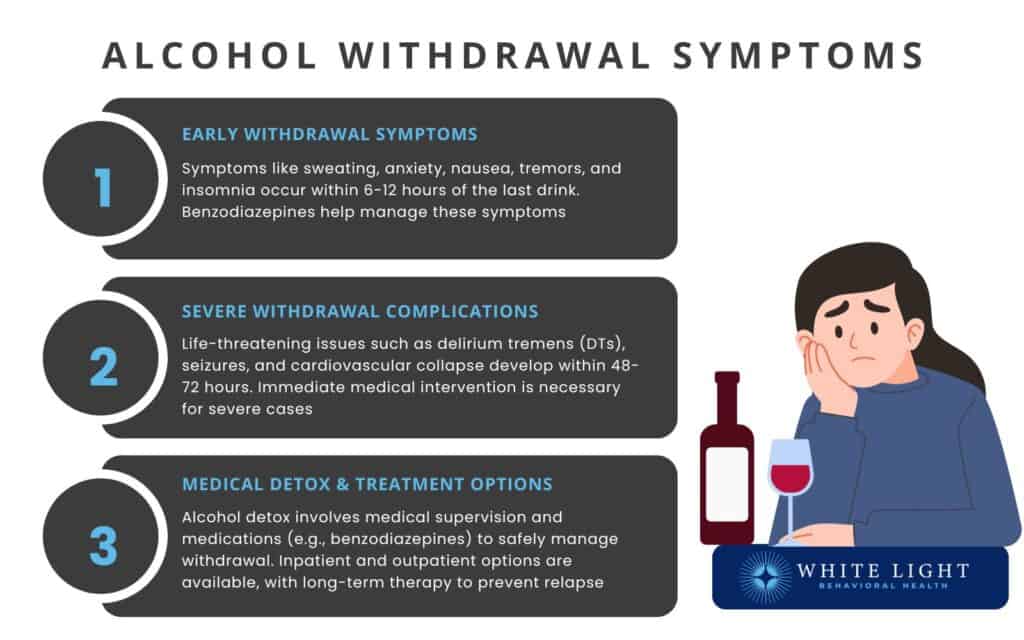
Early Alcohol Withdrawal Symptoms
Early withdrawal symptoms include sweating, anxiety, nausea, restlessness, hand tremors, and insomnia. These symptoms result from the sudden absence of alcohol, which disrupts the central nervous system’s balance. Benzodiazepines are prescribed to manage early withdrawal symptoms by calming the nervous system and preventing progression to severe withdrawal stages.
Severe Withdrawal Complications
Severe alcohol withdrawal complications are life-threatening, with the most dangerous being delirium tremens (DTs), seizures, and cardiovascular collapse. DTs occur in approximately 3% to 5% of people withdrawing from alcohol and cause hallucinations, confusion, high fever, and severe agitation, according to Rahman A, Paul M. et al., 2023, titled “Delirium Tremens.”
Immediate medical intervention with intravenous benzodiazepines and close monitoring in an intensive care unit is necessary for those at high risk of severe withdrawal.
How To Treat Alcohol Addiction Symptoms Through Medical Detox?
Alcohol addiction symptoms are treated through medical detox, inpatient programs, and outpatient programs. These treatment options provide a comprehensive structure to manage both the physical and behavioural aspects.
Medical detox refers to the process of eliminating alcohol from the body under the supervision of a licensed medical team to ensure safety and comfort. It includes the use of medications such as benzodiazepines, anticonvulsants, and beta-blockers to manage withdrawal symptoms and prevent complications.
Inpatient detox programs provide 24/7 medical monitoring, while outpatient detox programs offer supervised withdrawal management at home. Long-term treatment options, such as therapy and medication-assisted treatment (MAT), help individuals maintain sobriety and prevent relapse.
What is Dual Diagnosis in Alcohol Addiction?
Dual diagnosis in alcohol addiction is the simultaneous presence of Alcohol Use Disorder (AUD) and one or more mental health conditions, a condition also known as co-occurring disorder.
This means that individuals struggling with alcohol addiction experience psychiatric disorders such as anxiety, depression, post-traumatic stress disorder (PTSD), or bipolar disorder. Alcohol abuse exacerbates existing mental health conditions, while mental health disorders increase vulnerability to alcohol dependence.
A study by NIDA titled “Common Comorbidities with Substance Use Disorders Research Report shows that nearly 50% of individuals with a mental illness also experience substance use disorders, highlighting the strong link between AUD and psychiatric conditions.
Rediscover Life at White Light Behavioral Health
Get the compassionate support you deserve. We're here to help you reclaim joy, wellness, and a brighter future.
Our Facility
Why Do Alcohol Addiction & Mental Disorders Co-Exist?
Alcohol addiction and mental health disorders co-exist because Alcohol worsens mental health conditions, and pre-existing mental disorders lead to alcohol dependence. Alcohol worsens mental health conditions by disrupting brain chemistry, increasing depressive symptoms, and triggering anxiety. Conversely, pre-existing mental disorders lead to alcohol dependence as individuals use alcohol to self-medicate.
Where do I get Help for Alcohol Addiction in Columbus, Ohio?
You can get help for alcohol addiction in Columbus, Ohio, through reputable treatment centers and government-funded facilities. Rehabilitation centres, such as White Light Behavioral Health, offer detox and inpatient care in a supportive environment. There are programs tailored to your specific needs to guide you on the path to recovery.
What Alcohol Addiction Tests Are Available in Ohio?
Available alcohol addiction tests in Ohio include the Alcohol Use Disorders Identification Test (AUDIT), CAGE questionnaire, and DSM-5 diagnostic criteria. The AUDIT is a screening tool developed by the World Health Organization (WHO) that assesses drinking patterns and alcohol dependence risk.
The CAGE questionnaire is a short, four-question test used by healthcare providers to identify problematic drinking. The DSM-5 criteria, used by mental health professionals, diagnose AUD based on 11 key symptoms, ranging from loss of control over drinking to withdrawal effects.
Share This Post
